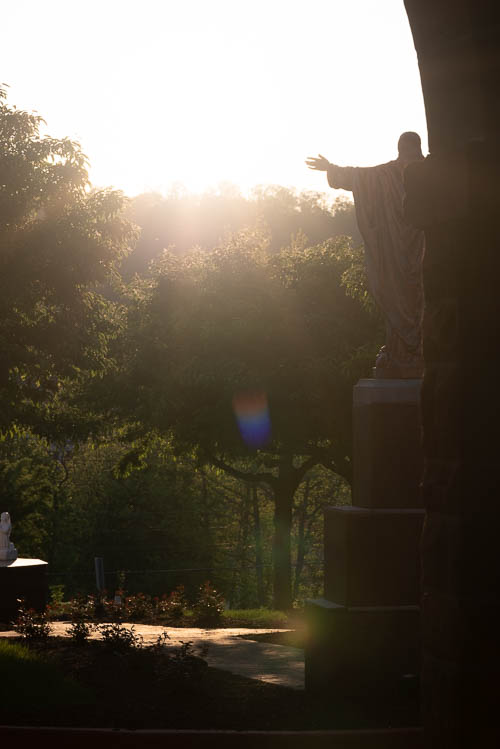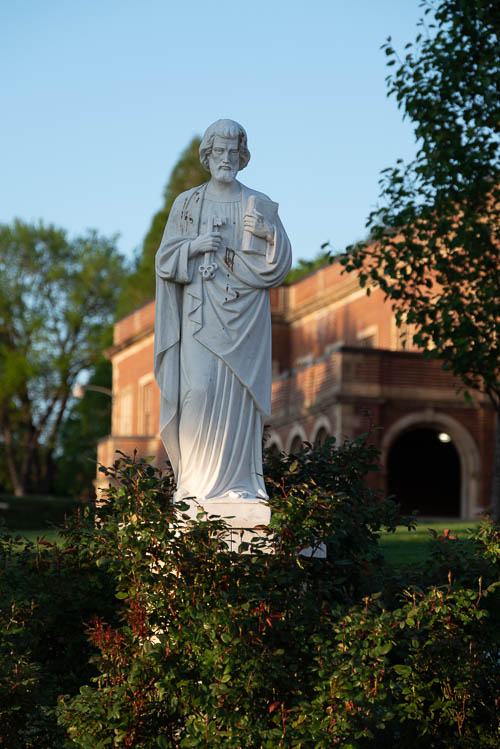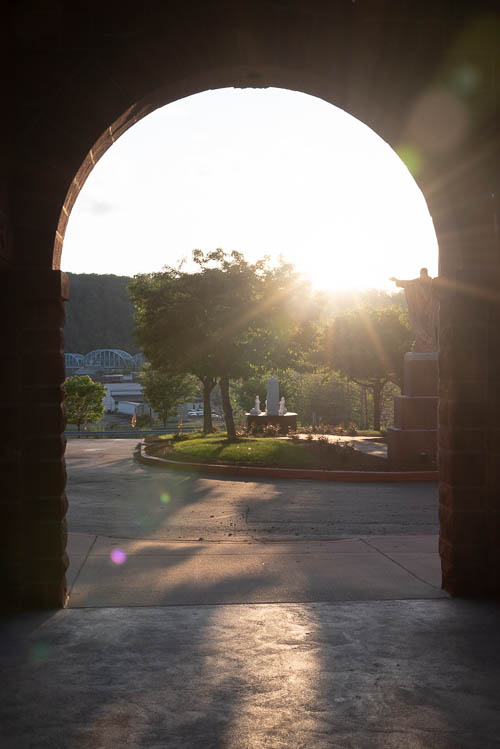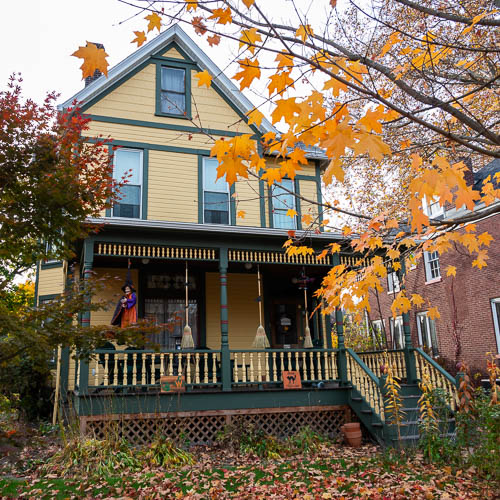
Happy Halloween from New Kensington!

Places and Their People, History, and Lore

My father, Robert Gaffron, passed away shortly after we put most of the Christmas cards into the mail.
I have reason to believe that my father returned from shopping at the Barnes and Noble in Greensburg, laid down in his own bed in his house where he lived with my mother from 1985 until her passing, went to sleep and just never woke up.
My sister requested a welfare check on Dad after she was unable to reach him. The police officer who located Dad and reached out to my sister with the news was very kind to her.
I am comforted that Dad very likely visited a bookstore as one of his last acts on this mortal coil, even if it was a corporately owned bookstore. He was a retired teacher. He made me recopy my homework when he deemed my handwriting too sloppy for my own teachers to read.
When my mom, Shirley, was ill, Dad promised her that he would ensure that their Daughter #5 graduated from college. (They were four down with one more to go on the college education thing when my mom passed away.) He kept this promise.
Here is a link to his obituary.
I’ll return to this blog later.

Look, a snake! Photo by Jenny Gaffron Woytek
My sister E. and I attended a Taylor Swift-themed dance party this past July. Imagine a black box theater packed with Swifties. In Virginia. (Okay, it was in Winchester. Old Town – Olde Towne? – Winchester. Directly across the street from a former courthouse-turned-Civil War museum.) The bar sold Taylor Swift-themed cocktails. There was a backdrop where we could take selfies in our ERAS ensembles.
Two men tried to crash the event in search of a woman from Tinder who told them that she couldn’t meet up with them because she had a ticket for this. Security wouldn’t let them inside. The event was sold out. They stood outside the door with the smokers and waited for the poor woman. Failing that, they tried to pick up anyone who made eye contact with them. The Swifties weren’t having any of this. My sister and I left the venue dehydrated and exhausted. It was fun.
On the drive back to Pennsylvania at the end of our weekend, we discussed an internet rumor. Apparently Taylor is a high priestess in a Satanic cult? She drops clues about her allegiance to the devil in her music videos? Something about snakes? And that’s the “obvious” explanation to her success?
I didn’t follow the exact details. I burned too many brain cells in the past few years. I’m sure that you can find it through a Google search.
Here’s what I told my sister about Taylor Swift’s pact with the devil: “They ripped that off of the myth of Robert Johnston!”
Robert Johnston was a blues musician. He went down in history for being one of the best blues musicians in American history. He was a black man who grew up in the Jim Crow South – in Mississippi. He died at the age of 27. (So, his story shows up in the Curse of 27 – also called the 27 Club – the legend that gifted musicians are fated to die at the age of 27.)
The other legend about Robert Johnson was that he started his musical career by being a really, really bad musician. So bad that at least one venue that booked him set him home early because he was so awful.
Then, he showed up for a gig one night and he was really, really good. And this was because he stood at a crossroads at midnight and made a pact with the devil. He pledged his soul to the devil in exchange for phenomenal musical talent.
Here are some podcasts that explore the story of Robert Johnson in more detail:
Radiolab – April 16, 2012 – Crossroads
Supernatural with Ashley Flowers
So, how do you explain the musical success of an impoverished African American in Mississippi in the 1930’s?
How do you explain the musical success of a woman named Taylor Swift? A woman whose fans are so devoted that they will reject men from Tinder so that they can celebrate her music with fellow Swifties?
I’m not a Swiftie. My husband Jonathan and I listen to Taylor Swift on vinyl, but Jonathan is the one who purchased the album. We planned to attend one of her concerts with some of my sisters. None of us were able to get tickets, so that was that. Jonathan and I could have stood outside of the stadium to listen when Taylor performed in Pittsburgh (lots of Swifties did this), but instead we spent that weekend on our boat on Lake Erie. Couldn’t pass up that beautiful sailing weather.
I actually travelled for a Taylor Swift dance party so that I could spend time with my sister. The dance party event was almost all women. There were a few men. Some of them wore rainbow clothing. At least one man wore a tee shirt that said, “I’m the husband, it’s me.” (It’s a play on the lyrics “I’m the problem, it’s me.“) The man who wore this shirt seemed to be responsible for making sure that a group of women had fun. That is, he brought them drinks and stuff.
So, this was an event in which scores of women came together in order to celebrate with a bunch of other women, as well as a few men, but the women didn’t seem to pay much attention to the men. Maybe the folklore about the devil worshipping and the snakes started because of this attitude. I didn’t meet Satan that night. The only snakes that I saw were the ones on the screen from Taylor’s one music video. I’m glad. Snakes scare me.
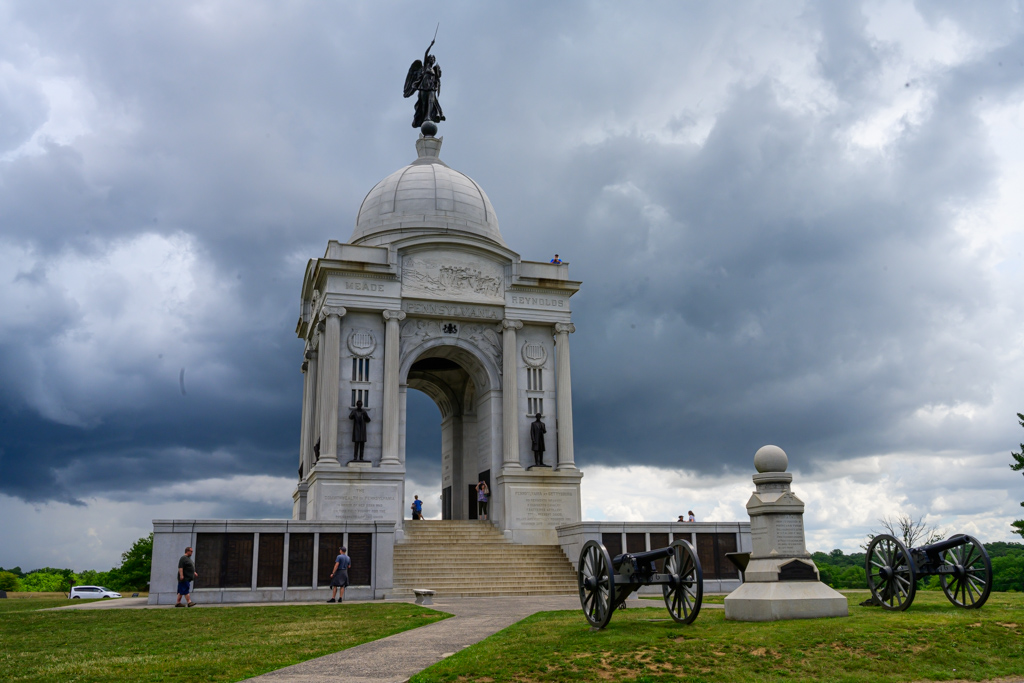
Photo by Jonathan Woytek, June 2023
Jonathan and I travelled to the Gettysburg area for a family event last month. Jonathan had never been to Gettysburg prior to this (except for driving past it on Route 30). So, after we checked out of our hotel, we drove around the battlefield before we drove home.
I learned the night before from a 12-year-old history buff that Little Round Top and Devil’s Den were both under remediation from the National Park Service and thus closed to the public.
“What else should we visit, then?” Jonathan asked me.
I remembered the Pennsylvania Monument and we directed Google maps to give us driving directions to it.
The Pennsylvania Monument is the largest state monument on the battlefield. The Commonwealth of Pennsylvania dedicated the uncompleted monument in 1910. The 50th anniversary commemoration for the battle happened in July 1913. The monument was completed in 1914 and rededicated on July 4, 1914. That’s what Wikipedia says, anyway.
(Wikipedia doesn’t mention this on the monument’s page, but Gavrilo Princip assassinated Archduke Franz Ferdinand on June 28, 1914. This set off a chain of events that resulted in the start of World War I on July 28, 1914. The United States entered World War I in April 1917.)
I didn’t bring my camera with me but Jonathan brought his. You can see the above photo and all of Jonathan’s other Gettysburg photos here on our other blog.
What Jonathan’s other photos didn’t show is this: shortly after we parked at the Pennsylvania monument, a bus bearing the name of a college in northern Michigan pulled up to the monument. Lots of college-looking kids poured out of the bus. A man who looked like a teacher reminded the kids to “remember your assignment.” The kids ascended to the top of the monument.
Now, on the PA monument, one can access a balcony underneath the dome at the top. In order to reach this balcony, you must climb the steps seen in the photo, and then climb a metal spiral staircase that is not seen in the photo.
I overhead a young man talking to a young woman. The young man must have been a member of a fire department, because he referenced “my district” and “fire call.” He told the young woman that the call was for a structure fire. The building in question had a spiral staircase “just like the one here.” He told her that the spiral staircase at said structure fire got very hot and that he had to carry a hose up it. “That was the worst fire call that I’ve ever had,” he said.
In order to get back on their bus, the Michigan college students had to tell their teacher which “spot” they had been assigned to identify, as they pointed in the direction of it. “Peach Orchard,” “Wheat Field,” “Devils Den,” “Little Round Top,” various students said.
A reenactment group positioned across the road from the PA monument demonstrated how to be Civil War infantry soldiers. They marched. They loaded rifles with powder. They fired. There were no bullets. We learned that the National Park Service doesn’t permit the use of bayonets on NPS grounds; nevertheless, we saw a bayonet demonstration sans bayonet. The NPS staffer identified the group as volunteers re-enacting a regiment from Maine. However, three of the men were actually from Germany.
A short trip down the road from the PA monument (the PA monument was still in sight) we stopped to look at some other monuments because a vulture sat on one of these other monuments. The vulture’s mate stood on the ground nearby, eating a squirrel. Jonathan photographed the turkey vulture on the monument. You can see two photos of it on our other blog.
Eventually, another car with a PA license plate pulled up next to our car.
“The vultures return at this same time of year, every year,” the driver told us.
It was about a week before the anniversary of the Battle of Gettysburg.
Jonathan said, “One of them was eating a squirrel before I scared it.”
The driver speculated about the vultures’ presence in July 1863.
“You know what they were feeding on back then, right?” he said.
Then he drove off.
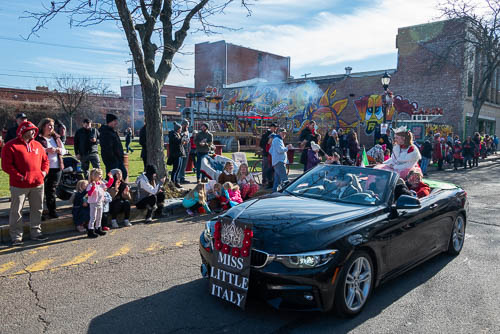
My husband, Jonathan, made a Christmas video and posted it to our other blog.
Here’s the link: https://www.jennyandjonathangetmarried.com/lifeblog/2021/12/merry-christmas-heres-a-video/
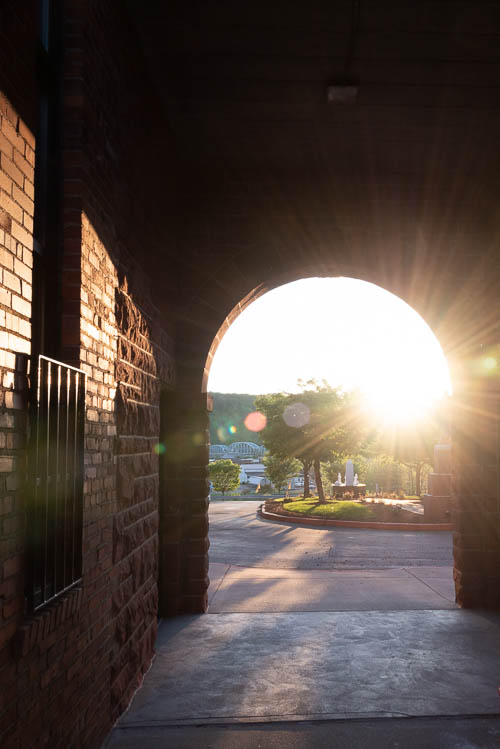
So, a little bit over a week ago, my maternal grandmother died. Grandma Margaret.
Grandma celebrated her 90th birthday this past summer. In fact, she celebrated her birthday during the week between my birthday and my sister’s birthday, and several other family birthdays occurred during this same week. Grandma left behind a lot of people who loved her. However, I understand that all or almost all people who live to the age of 90 lose much. My grandfather died several years ago. And, as Grandma reminded me, she herself had only one sister, named Shirley. Shirley died of cancer in her 20’s. About two years after the first Shirley died, my grandmother had my mom and she named my mom Shirley. My mom, the second Shirley, died of cancer three years ago. Grandma wondered about this to me. She wondered about the odds of losing both of her Shirleys to the same disease, decades apart.
But, I remember something completely different now. After my mom died, I sat and looked through Grandma’s photo albums with her. We looked through an album consisting mostly of photos that Grandma herself took. Grandma took A LOT of photos of sunrises and sunsets. She took some of these photos when she visited my uncle in Florida. She took other sunset photos over the winter countryside after my grandparents retired and moved out to farmland in Beaver County and raised goats. She took them with her point-and-shoot camera. She paid to develop them, then put them into her photo albums along with her photos of her family.
I learned that day that when I enjoy a sunrise or a sunset, I owe this at least in part to Grandma Margaret.
Sunrises are beautiful. Sunsets are sad but also beautiful. Neither exists without the other.
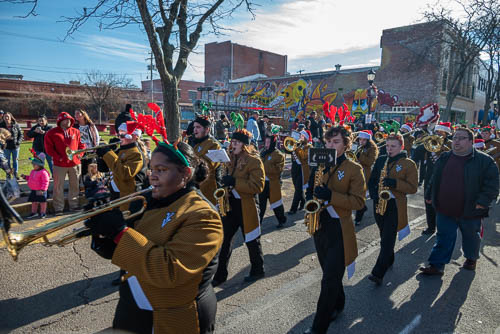
If you Google “New Kensington” and “Voodoo Brewery,” you can find a lot of photos of Shane Pilster’s “Rising Phoenix” mural. In fact, here are photos that I took last December, a week after Krampus brought me my camera.
You can also find a lot of information about New Kensington’s Voodoo Brewery / Voodoo at the Ritz and Old Town Overhaul with a quick Google search. Here’s such an article from the Trib.
So, for this blog post, I took a bunch of photos that showed the “Rising Phoenix” mural in the background as the community gathered for New Kensington’s Christmas Parade.
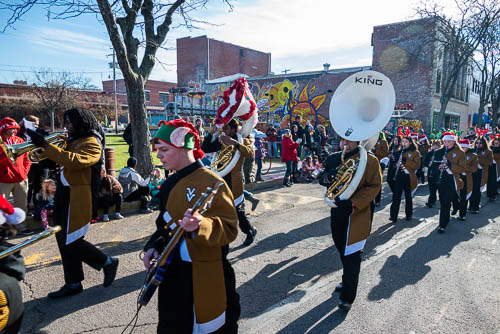
I felt really defeated last spring over the setbacks that Jonathan and I had encountered in trying to rebuild our front porch. I wrote a snarky post on this very blog about how murals weren’t going to solve New Kensington’s problems. The murals weren’t solving any of MY problems. My sister Elizabeth is a hero because she read the post right after I published it. She told me that I was harsh. I took the blog post down about an hour after I published it. The post now resides for eternity in blog post hell. Or, maybe it resides in blog post purgatory because with my luck it’s cached somewhere.
But, now our porch is almost complete. I feel much more hopeful about my future here in New Kensington.
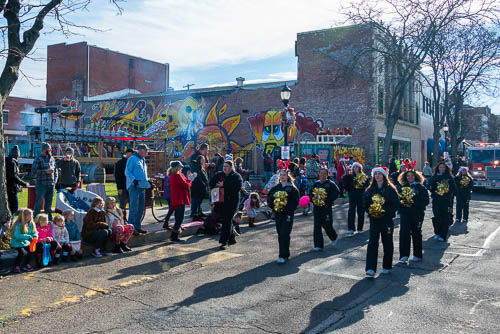
These marchers arrived on a bus from Valley High School in New Kensington. I watched the bus arrive. It travelled past me and unloaded on the next block over from where I sat waiting the parade to begin. I saw kids sitting next to the windows, holding their trombones.
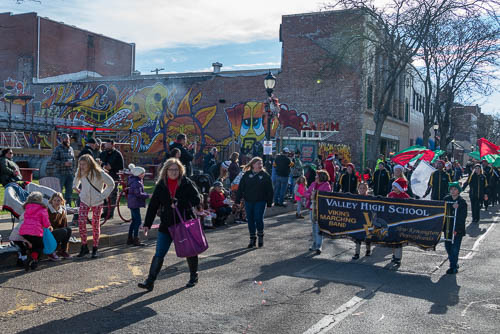
I have a soft spot for the high school marching band. I marched in a high school band when I grew up in Somerset County. I played the clarinet.
I don’t remember getting to march past any cool brewery murals, though.
I have a sister named Katie. We were born two years and five days apart. So, we started off life by always having to share our birthday week.
Then, we just kept on doing a lot of the same stuff. We camped with the same Girl Scout troops. We both won the social studies award in elementary school. We both played the clarinet. (Katie later switched to trumpet.) We both marched in the high school marching band for four years. We both learned about politics at Keystone Girls State. We worked at the same shitty fast food restaurant (the managers were shitty and the customers were also shitty) next to the Pennsylvania Turnpike in Somerset when we were each 17 going on 18. I worked at a library for four years. Katie went and became an actual librarian.
We both blog.
A few weeks ago, Katie quit Facebook and Instagram. She promoted the link to subscribe to her blog. Then, her Facebook and Instagram profiles went away. Katie then reached out to me by phone to ask me how she could subscribe to my own blog.
Here is the blog post that Katie wrote about quitting Facebook and also about finishing her second half marathon. (I have never voluntarily run anywhere in my entire life, let alone run in any kind of race for fun. Here’s one way in which Katie and I are different.)
Katie makes a lot of good points about why she left Facebook. I respect Katie’s decision to leave. I haven’t been able to completely break with Facebook myself. However, I look up to Katie as a role model even though I’m the older sister.
So, in Katie’s spirit, I’m going to stop posting on Facebook. I won’t even post links to my blog. If you want to know when I post new content, you can subscribe to my blog using the box on the top right. Jonathan helped me to set up the “subscribe” option tonight. We just tested it.
After you subscribe to the Parnassus Pen, you will receive emails whenever I post here. These emails will include a lovely avatar photo of me looking out over a canal in Amsterdam, pre-Covid and pre-lockdowns.
Thank you for reading my blog and thank you for your comments and support.
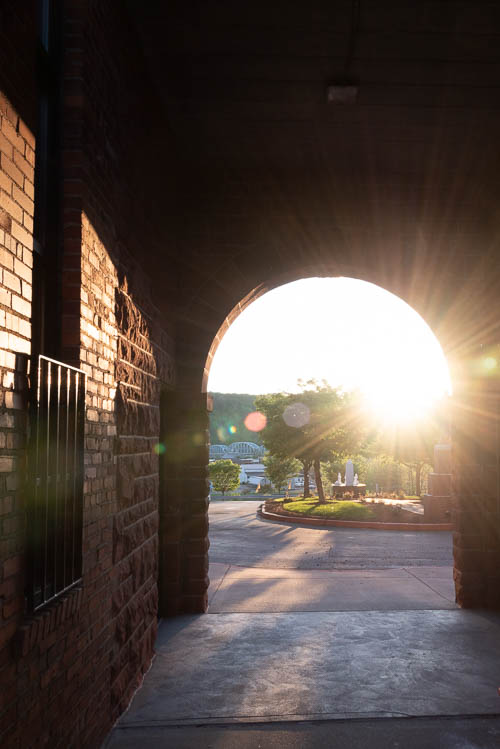
Eight days ago (so, on April 29), Jonathan and I celebrated our fifteenth wedding anniversary. We were married at Mount Saint Peter in New Kensington. Jonathan’s late mother, Fran, worked at the parish at that time. So, I have a special place in my heart for Mount Saint Peter.
I look for opportunities to develop my skill at sunset photography. So, I took my camera to Mount Saint Peter for this evening’s sunset. This almost didn’t happen because clouds frequently covered the sun this afternoon! In fact, clouds covered the sun WHILE I waited at Mount Saint Peter for the sun to set.
The clouds moved just in time for me to witness the sunset.
Now, you will see a bridge in the background of the first photo that I posted. This bridge crosses the Allegheny River in downtown New Kensington. The bridge sits in the river valley. Much of New Kensington sits in this same valley. However, Mount Saint Peter sits on a hill overlooking downtown New Ken.
I mention all of this because I like to think of the Allegheny River as “my river.” The Allegheny River is obviously NOT merely “my river.” I was actually born directly across the Susquehanna River from Harrisburg. I grew up near the Susquehanna and in the Allegheny Mountains. However, ever since I was a child and I visited my grandparents in Pittsburgh, I felt as if I belonged with the Allegheny River. Perhaps I lived along the Allegheny in another life? Perhaps I was always destined to return to the Allegheny?
